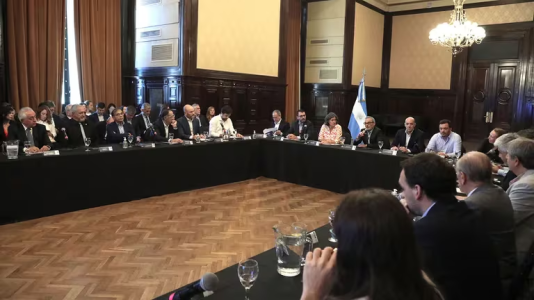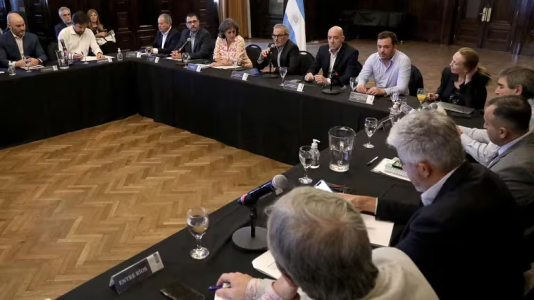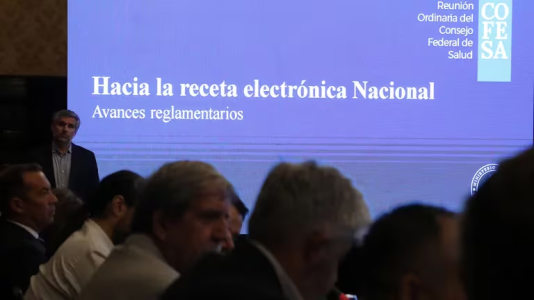All the Answers
Well-known member
Concern about the increase in dengue cases is one of the axes of the meeting of health ministers from across the country - Infobae

Source:

La preocupación por el aumento de los casos de dengue es uno de los ejes de la reunión de los ministros de salud de todo el país
Se realiza el primer encuentro del Consejo Federal de Salud (COFESA); por primera vez lo encabeza Mario Russo, titular de la cartera sanitaria
March 25, 2024
The first meeting of the Federal Health Council (COFESA) is held; for the first time it is headed by Mario Russo, head of the health portfolio
By Eduardo Menegazzi

El ministro de Salud de la Nación, Mario Russo, le habla a sus pares de las 24 jurisdicciones en el CCK. Es la primera reunión del COFESA bajo su gestión.
Luego de un paréntesis de cuatro meses se volvió a reunir el Consejo Federal de Salud (COFESA). Encabezado por primera vez por el ministro de Salud de la Nación, Mario Russo, convocó en el Centro Cultural Kirchner, desde las 9.30 y hasta las 17, a los titulares de las carteras de Salud de las 24 jurisdicciones del país. La situación epidemiológica del dengue y el lanzamiento de una campaña de vacunación antigripal serán dos de los temas centrales que se abordarán.
El dengue, la enfermedad viral transmitida por el mosquito Aedes aegypti, alcanzó cifras muy preocupantes en la Argentina, donde según el último reporte del Ministerio de Salud se registraron 151.310 casos con 106 muertes confirmadas. Así se superó la cifra del año anterior y en muchos centros de salud las guardias colapsaron debido a la gran cantidad de consultas.
“En comparación con otros años epidémicos, la actual temporada se caracteriza por ser la de mayor magnitud, de comienzo más temprano y, como se mencionó más arriba, por la persistencia de casos durante todas las semanas hasta el momento. El mayor número de casos se registró hasta el momento en la semana 10 de 24 (del 3 al 9 de marzo) con 23.723, lo que representa el máximo histórico hasta la fecha de casos registrados en una semana”, se consigna en ese mismo informe.
En parte debido al cambio de autoridades, tanto a nivel nacional como provincial, el COFESA no se reunía desde el mes de noviembre. Los ministros de salud de varias jurisdicciones venían planteando la necesidad de un encuentro de este tipo para conocerse y empezar el análisis de los principales desafíos de la agenda sanitaria y avanzar en acciones conjuntas.

Ministry of Health of the Nation
On the day, the national health authorities will also report on the start of the flu vaccination campaign, free of charge, throughout the national territory and will present the guidelines of the national Quality and Digital Health policies, two of the central axes that promotes the National Ministry, among other topics.
Gabriel Battistella, Secretary of Primary Care of the City of Buenos, who represented the district governed by Jorge Macri in addition to Minister Fernán Quirós, said before entering the CCK that in the City "it is the third week in which the cases are among the 1,000 and 2,000 weekly. We still have two or three intense weeks ahead of us . ” Regarding the prevention measures that can be adopted, he recommended "drinking plenty of fluids, not becoming dehydrated, and lowering the fever before going to the consultation." Battistella said that the inclusion of the dengue vaccine as mandatory will depend on “what the National Immunization Commission says.”
For his part, the Buenos Aires minister, Nicolás Kreplak, was very critical of Russo's management. Regarding the dengue outbreak, he expressed that “this will not be an action meeting, because we did what had to be done, we took care of it. The Nation should have taken care of it and now it is too late. He did not do it. "We would have to work on communication, explain how to reduce infections in the workplace, and provide us with diagnostic tests, for example."
Kreplak pointed out that there are other issues that should be discussed such as "accessibility to health centers, the increase in medications, what is going to happen to social works as a result of the deregulation of the national State, which is going to make many are founded and those destined for the upper classes survive”
Kreplak is also concerned that the programs promoted by Alberto Fernández's administration continue to be implemented, such as those related to "hospital equipment, the provision of resonators and tomographs, among other things."

On the screen, one of the initiatives promoted by the Ministry of Health of the Nation, the national electronic prescription.
The Government announced today that it will begin anti-flu. It is intended for the following groups: 1) Health personnel, people from 9 to 64 years old, including those with risk factors, and people 65 years old or older, receive one annual dose; 2) People from 6 to 24 months and from 2 to 8 years old, inclusive, with risk factors, must receive two doses separated by at least 4 weeks, except for those who have previously received two doses who are assigned one dose; 3) Pregnant people should receive the flu vaccine at any time during pregnancy; 4) Postpartum people should receive the flu vaccine before leaving the maternity hospital, maximum 10 days after delivery if they did not receive it during pregnancy.
The ministry also pointed out that the following are considered risk factors: obesity, diabetes, chronic respiratory and heart diseases, congenital or acquired immunodeficiencies, oncohematological disease, transplant and/or people with chronic kidney failure on dialysis, among others.
The flu vaccine is free for the target population, does not require a doctor's order, and can be administered along with any other vaccine on the National Schedule. In addition, they stressed that those who go to vaccination centers, health centers or public hospitals should bring their vaccination card and that of their sons and daughters for a checkup by the health team.

